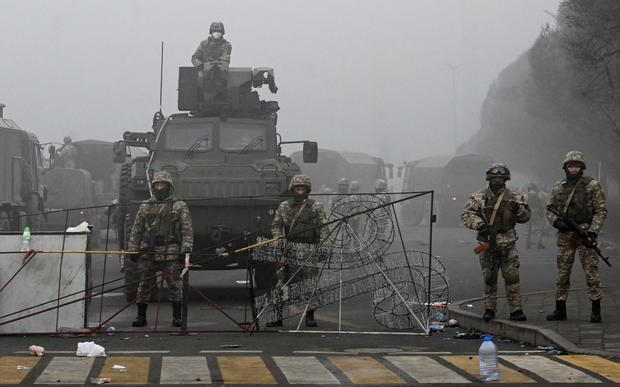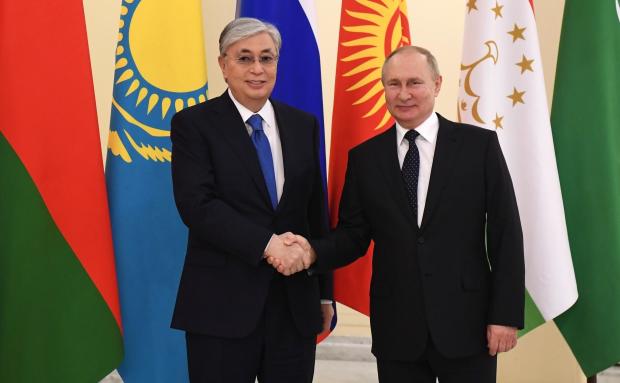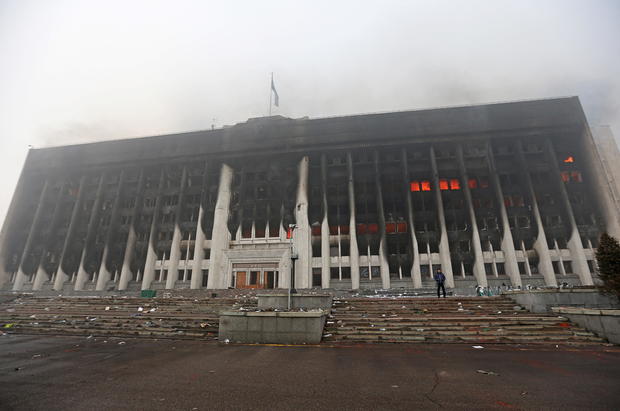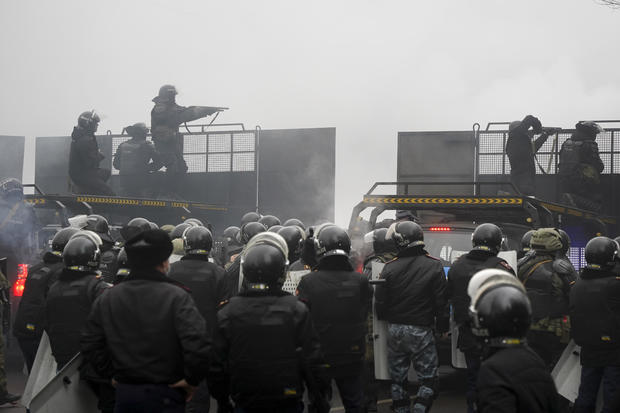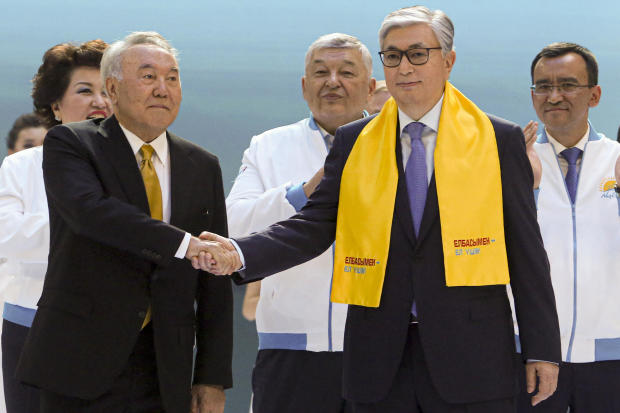Kazakh leader rejects talks, tells forces to
Almaty, Kazakhstan — Kazakhstan’s president on Friday rejected calls for talks with protesters after days of unprecedented unrest, vowing to destroy “armed bandits” and authorizing his forces to shoot to kill without warning. President Kassym-Jomart Tokayev said earlier that order had mostly been restored across the country, after protests this week over fuel prices escalated into widespread violence, especially in the country’s biggest city of Almaty.
“Terrorists continue to damage property… and use weapons against civilians. I have given the order to law enforcement to shoot to kill without warning,” Tokayev said in his third televised address to the nation this week.
He ridiculed calls from Western nations’ to hold negotiations with the protesters as “idiotic,” vowing not to talk to “criminals and murderers.”
MARIYA GORDEYEVA/REUTERS
“We are dealing with armed and trained bandits, both local and foreign. With bandits and terrorists. So, they must be destroyed. This will be done shortly,” the president said.
Long seen as one the most stable of the ex-Soviet republics of Central Asia, energy-rich Kazakhstan is facing its biggest crisis in decades. Protesters stormed government buildings in Almaty on Wednesday and fought running battles with police and the military, with officials saying 748 security officers were wounded and 18 killed.
Tokayev said Almaty had been attacked by “20,000 bandits” with a “clear plan of attack, coordination of actions and high combat readiness.”
He gave his “special thanks” to Russian President Vladimir Putin, after the Moscow-dominated Collective Security Treaty Organization (CSTO) sent troops to Kazakhstan to help quell the unrest.
KREMLIN PRESS OFFICE/Anadolu Agency/Getty
The interior ministry said Friday that security forces had taken all the country’s regions “under increased protection” and that 26 “armed criminals” had been killed and 18 wounded in the unrest.
CBS News’ Mary Ilyushina in Moscow said videos posted to social media showed continued clashes in Almaty on Friday. Local media said government sites had been surrounded by military forces, however, who were firing into the air to keep demonstrators at bay. Several local outlets reported bodies piling up in the city center and being slowly taken away by officials.
Tokayev earlier declared a nationwide state of emergency and appealed for help from the CSTO, which includes five other ex-Soviet states, to combat what he called “terrorist groups” that had “received extensive training abroad.”
The first units of Russian forces arrived in Kazakhstan on Thursday, the Russian defense ministry confirmed, after Tokayev appealed for assistance on Wednesday. It marked the alliance’s first major joint action since its founding in 1999.
PAVEL MIKHEYEV/REUTERS
Russia said it saw the unrest as “an attempt inspired from outside to undermine the security and integrity” of Kazakhstan.
The interior ministry said Thursday it had detained about 2,300 people.
Officials said more than 1,000 people had been wounded in the unrest, with nearly 400 admitted to hospital and more than 60 in intensive care.
Protests spread across the nation of 19 million this week in outrage over a New Year increase in prices for liquid petroleum gas (LPG), which is used to fuel many cars in the country.
Thousands took to the streets in Almaty and in the western province of Mangystau, saying the price rise was unfair given oil and gas exporter Kazakhstan’s vast energy reserves.
Vladimir Tretyakov/AP
The full picture of the chaos has often been unclear, with widespread disruptions to communications including mobile phone signals, the blocking of online messengers and hours-long internet shutdowns.
The protests are the biggest threat so far to the regime established by Kazakhstan’s founding president Nursultan Nazarbayev, who stepped down in 2019 and hand-picked Tokayev as his successor.
Tokayev tried to head off further unrest by announcing the resignation of the cabinet early on Wednesday, but protests continued.
Authorities declared a nationwide state of emergency until January 19, with curfews, restrictions on movements and bans on mass gatherings.
The government made another concession on Thursday, setting new fuel price limits for six months, saying “urgent” measures were needed “to stabilize the socio-economic situation.”
Alexei Filippov/AP
Much of the anger appeared directed at Nazarbayev, who is 81 and had ruled Kazakhstan since 1989 before handing power to Tokayev.
Many protesters shouted “Old Man Out!” in reference to Nazarbayev and a statue of the ex-leader was torn down in the southern city of Taldykorgan.
Western countries have called for restraint on all sides, with U.S. State Department spokesman Ned Price warning Russian troops in Kazakhstan against taking control of the country’s institutions.
“The United States and, frankly, the world will be watching for any violation of human rights,” Price said.
Download our Free App
For Breaking News & Analysis Download the Free CBS News app
For all the latest World News Click Here
For the latest news and updates, follow us on Google News.


